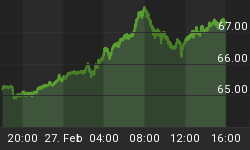Reader "Nate" noted that Bloomberg columnist Megan McArdle stated that banning Fractional Reserve banking won't work.
Nate asked "What would a future without fractional-reserve banking look like?"
Let's start with a look at Megan McArdle's article: Banking Without Risk Is Impossible.
The fundamental fact of a banking crisis, which is different from a crisis in any other industry, is that if people believe a financial institution to be bankrupt, it actually is bankrupt.
As Arnold Kling puts it, banks exist to reconcile the desire of households to lend short and borrow long -- we want to have bank accounts we can empty at any time we want, but we want mortgage loans that carry fixed payments and last for decades.
This creates a vulnerability at the heart of modern banks: If too many depositors try to turn their bank accounts into cash at the same time, the bank will be insolvent, because it cannot liquidate the mortgages fast enough to pay the depositors. And when are you most likely to get a flood of people trying to empty their accounts? When they think the bank is insolvent.
So why not build a banking system where this can't happen? Well, alright. How shall we do that? Are we going to forbid the structure of modern banks ("fractional reserve banking," for those who are interested in the technical term).
Leave aside the irony that outlawing a practice engaged in by millions of upstanding Americans is not, at first blush, a particularly libertarian solution.
I've heard arguments that you could fix this by allowing banks to freeze withdrawals in the event of a liquidity crisis. But I'm unpersuaded because during the Great Depression many places did freeze withdrawals.....
Megan McArdle Wrong Twice
For starters a 100% reserve system is indeed a "particularly libertarian solution" for the simple reason fractional reserve lending is fraud.
If I lent you a house that I did not have ownership of (or rights of control to), I surely would be convicted of fraud. If I sold you 100 tons of wheat, and only had 10, I likewise would be convicted of fraud.
Reflections on "Legitimate" Right-To-Use
Some argue that as long as customers agree to these various banking schemes it is OK.
However, it's not OK because such lending is nothing more than a gigantic kiting scheme. Moreover, it affects others by cheapening the value of money, pushing up asset prices for the benefit of those with first access to money, the banks and the wealthy.
Logically, two people cannot have the right to use the same money at the same time, whether they agree to such a scheme or not!
Banks are allowed to lend money that does not exist, but if you or I did it, we would be convicted of kiting (fraud).
100% Reserve System Does Not Mean There Will Be No Loans
Megan McArdle is also wrong about lending. A 100% reserve system does not mean there will be no loans. Instead it means banks cannot make loans for longer duration than they have ownership or control of the money.
If banks want to lend money for 30 years then need to have 30-year term deposits. If banks want to lend for 5-years then they need to secure money for 5 years. Might this mean the end of 30-year mortgages?
Perhaps, perhaps not. Perhaps it just means the end of cheap 30-year mortgages. As far as I am concerned that would be a good thing. 30-year mortgages with credit created out of nowhere fueled the property bubble.
Would it mean the end of mortgages? Certainly not but 10 and 15-year mortgages would carry a far lower rate than 30-year mortgages than they do now. And why shouldn't they? Are not 30-year mortgages inherently more risky?
Checking Accounts vs. CDs
Since checking accounts represent money on demand, banks could not lend them at all in a 100% reserve system. Such deposits would indeed be risk-free. They would be fee-based, but without risk.
Want to collect interest on CDs? OK, but such deposits would no longer be risk-free.
Notice that a run on the banks in a full reserve system is not likely. 100% of demand deposits are always available. And term deposits would match term-loans and no longer.
Of course, banks can foolishly lend money and not be able to return it at the end of the period. But that is the risk people take when they lend banks money. If people do not want to take those risks, they can leave the money in checking accounts and pay a fee for storage.
For more on the case against Fractional Reserve Lending please see
-
Fractional Reserve Banking by Murray Rothbard.
-
Case Against The Fed by Murray Rothbard
Please click on the second link above and read it.
On page 46 of the book Case Against The Fed Rothbard says "By the very nature of fractional Reserve Lending, banks cannot honor all its contracts".
Does knowingly entering a contract that one cannot possibly honor, constitute fraud? Of course it does.
I have talked about these issues many times before. For a synopsis, please see Central Bank Authorized Fraud; Fractional Reserve Lending Problems Go Far Beyond "Duration Mismatch".
Megan McArdle seriously needs to read the eBooks above, starting with Case Against The Fed.















